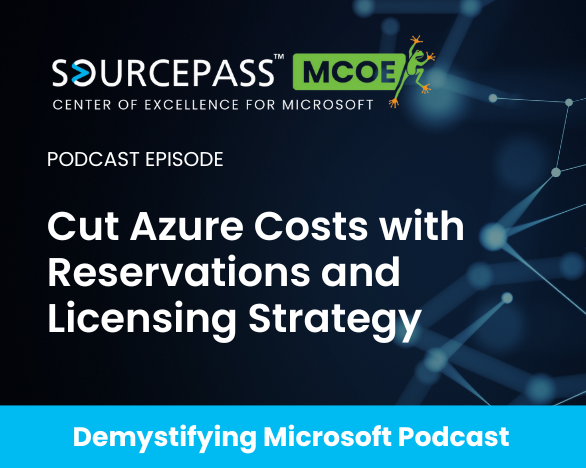6 min read
Microsoft Licensing Update: GPT 5.2 Brings New Copilot Modes
Microsoft’s addition of GPT‑5.2 to Copilot introduces two distinct modes that meaningfully change how you interact with information and...
3 min read
Nicole Walker
:
Updated on December 3, 2025

Cloud cost optimization in Azure isn’t just about visibility. It’s about precision. As environments scale and workloads evolve, the real challenge becomes identifying which cost-saving levers actually move the needle.
The most effective strategies involve understanding how Azure bills for compute, storage, and licensing, and knowing when to commit, resize, or retire. Organizations that move beyond surface-level dashboards and apply targeted cost controls are better equipped to manage budgets and maximize the value of their cloud investments.
In this episode of Demystifying Microsoft podcast, Nathan Taylor (SVP, Global Microsoft Practice Leader at Sourcepass MCOE) explores the fundamentals and advanced strategies for managing Azure costs. The discussion covers how consumption-based billing works, why resource optimization matters, and which tools provide the most actionable insights for controlling cloud expenses. It outlines how to use Azure Advisor, the Cost Management Portal, and third-party platforms to drive financial accountability and improve operational efficiency across dynamic environments.
The most effective ways to reduce Azure costs begin with identifying what’s running, why it’s running, and whether it needs to be. Cleaning up unused resources and resizing over-provisioned workloads are foundational steps.
Committing to reservations for predictable workloads can yield significant discounts, while hybrid use benefits reduce licensing costs for Windows Server deployments. Savings plans offer flexibility for environments with fluctuating usage.
Azure Advisor helps surface these opportunities, but deeper savings often come from combining its recommendations with manual validation, pricing calculator modeling, and partner-led assessments that account for licensing, infrastructure, and operational context.
Azure Cost Management addresses overspending by providing visibility into resource usage and cost drivers. Key strategies include:
Azure Advisor offers recommendations based on best practices, helping organizations identify oversized VMs, unattached disks, and security vulnerabilities. The Cost Management Portal enables proactive monitoring, budget alerts, and scheduled exports for integration with external systems.
Reservations offer deeper discounts for specific resources over a fixed term, while savings plans provide more flexibility by applying discounts across eligible compute services based on a committed spend.
Hybrid Use Benefit allows you to apply existing Windows Server licenses to Azure VMs, reducing compute costs by up to 40 percent when properly configured.
Azure Advisor flags underutilized VMs and unattached disks, while the Cost Management Portal provides usage trends and forecasting. Third-party platforms like Nerdio and Calibrate offer deeper automation and reporting.
Yes. You can resize workloads, clean up unused resources, and use savings plans for flexible discounts. Turning off VMs during non-peak hours also helps reduce spend without long-term commitments.
Use the Cost Management Portal’s dashboards and scheduled exports. Set up budget alerts and anomaly detection to catch unexpected spikes early.
Cloud cost optimization isn’t a one-time fix. It’s an ongoing process that requires visibility, context, and the right tools. Whether you're managing legacy workloads, scaling virtual desktops, or navigating licensing complexity, the Sourcepass Center of Excellence for Microsoft helps you move from reactive budgeting to proactive cost control. Our team combines technical insight with licensing fluency to help you reduce spend, improve predictability, and reinvest in what matters most: security, modernization, and scale.
For ongoing updates and practical insights on Azure Cost Management, subscribe to the Demystifying Microsoft podcast.
If you have questions about optimizing your cloud spend or want to discuss options for deploying cost management tools, connect with one of our experts at the Sourcepass Center of Excellence for Microsoft.
Explore more in our Azure Cost Management series:

6 min read
Microsoft’s addition of GPT‑5.2 to Copilot introduces two distinct modes that meaningfully change how you interact with information and...

8 min read
Microsoft is rebuilding Planner within Teams for early 2026, introducing new collaboration features, deeper AI support, and several key retirements...

7 min read
Microsoft is introducing major changes to Microsoft 365 pricing and licensing in 2026.

Organizations using Microsoft Azure often face unpredictable cloud bills and wasted spend. The most effective way to reduce costs is to understand...

Changes to Microsoft’s licensing model this year will impact subscription costs, product configurations, and long-term planning for infrastructure...

Hybrid IT has evolved from a transitional model into a long-term strategy. What began as a way to bridge on-premises infrastructure with emerging...